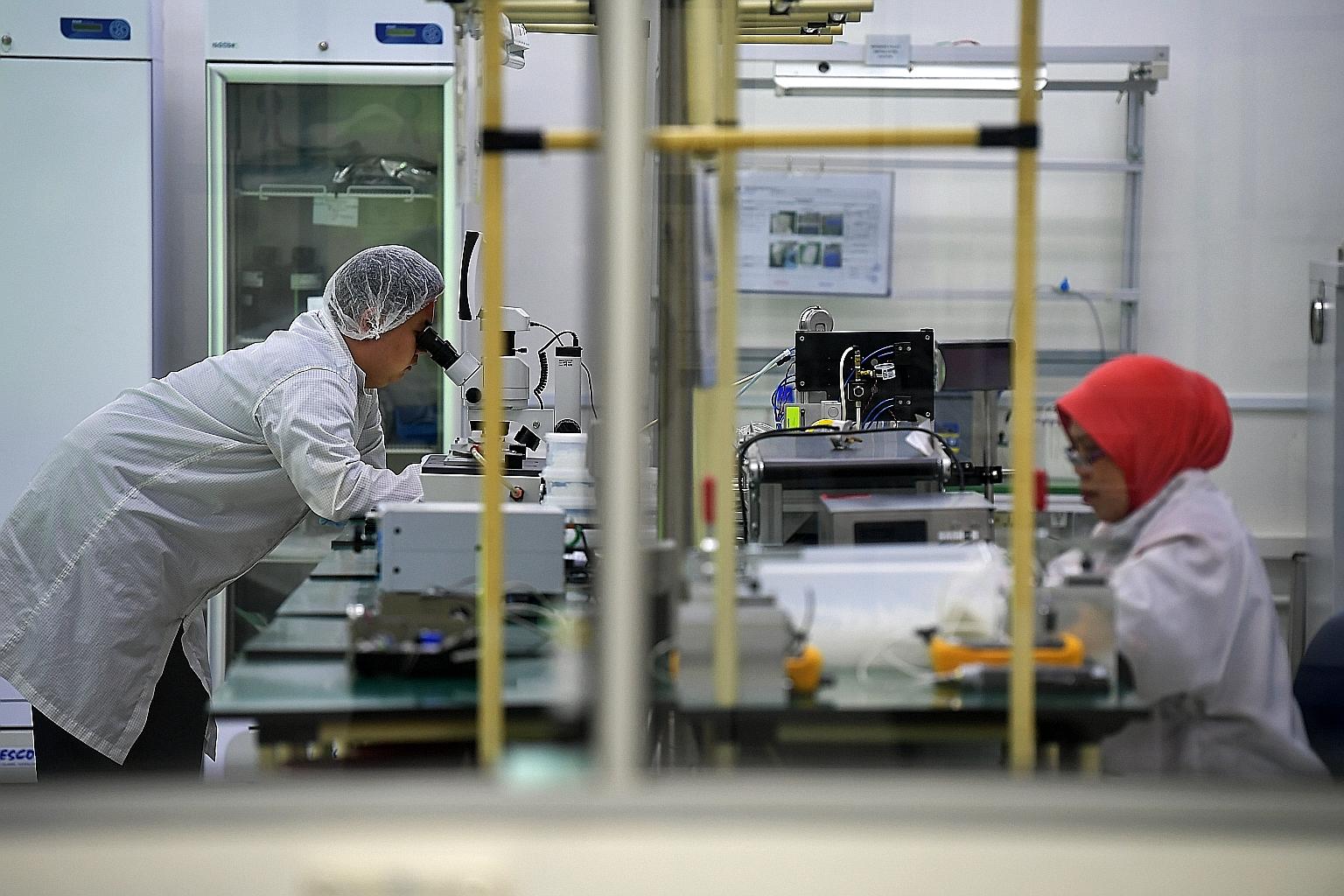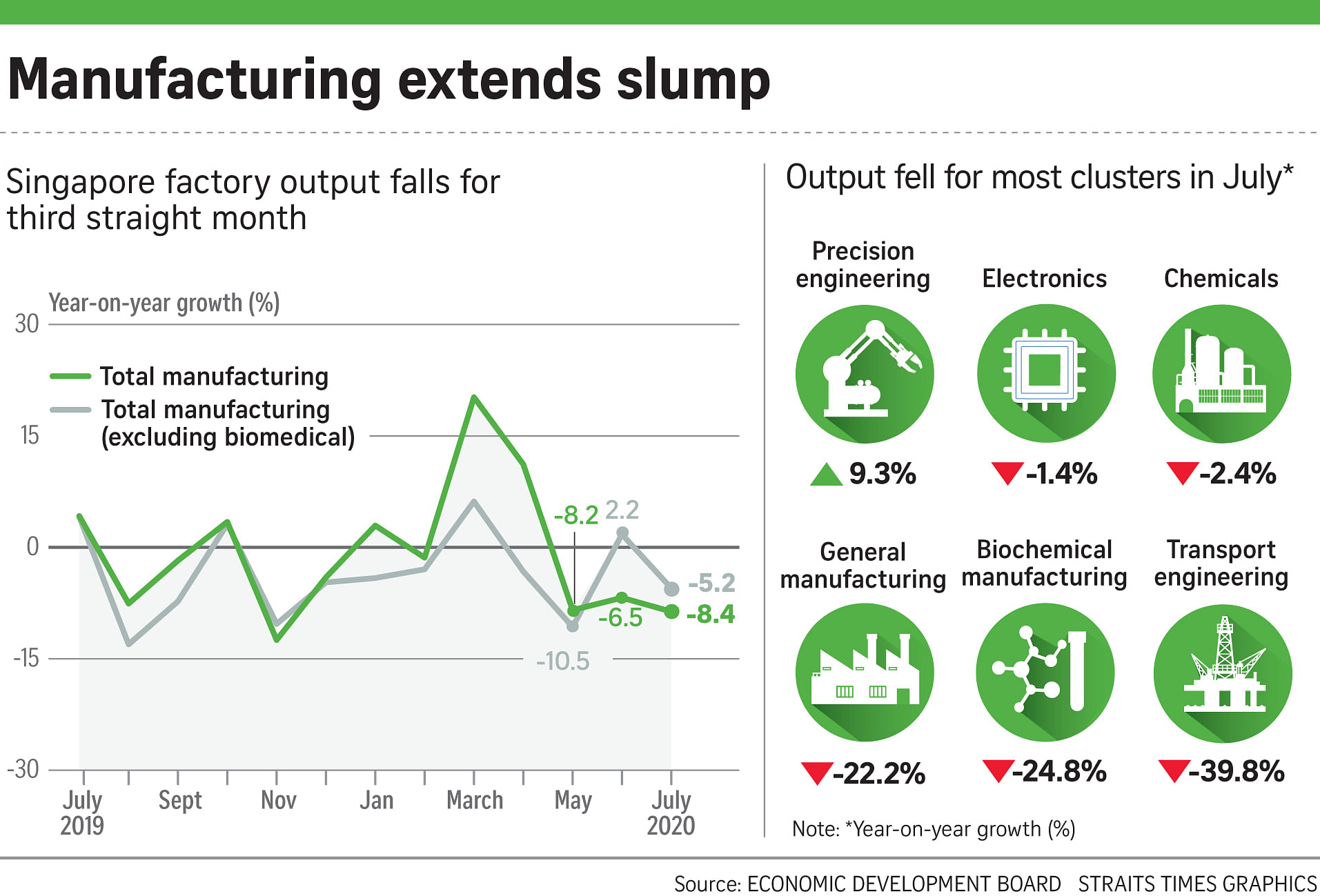Singapore factory output shrinks 8.4% on further biomed declines
Still, experts expect manufacturing to lead recovery while services lag due to pandemic
Sign up now: Get ST's newsletters delivered to your inbox

Workers at a medical technology facility last year. The medical technology segment fell 10.1 per cent in July from the same month last year, while pharmaceuticals fell 30.5 per cent due to lower output in biological products and a different mix of active ingredients from a year earlier.
ST PHOTO: KUA CHEE SIONG
Follow topic:
Factory output has racked up its third straight month of contraction on the back of further declines in the volatile biomedical sector.
Overall production fell 8.4 per cent in July from the same month last year - a steeper drop than the revised 6.5 per cent fall in June.
Exclude biomedical manufacturing and the decline would be 5.2 per cent, according to Economic Development Board (EDB) data yesterday.
JP Morgan analyst Ong Sin Beng said that despite these numbers, manufacturing is still expected to lead the economic recovery while services lag due to the pandemic.
He said: "Although the headline sequential growth rates remain negative, the levels suggest that stabilisation is occurring. Of note, tech output firmed in July and the broader index, excluding tech and biomedical products, also looks to be turning up, following material weakness in the second quarter of this year."
Biomed manufacturing output plunged 24.8 per cent compared with July last year, making it the second consecutive month of decline.
The medical technology segment was well down as well, dropping 10.1 per cent, while pharmaceuticals fell 30.5 per cent due to lower output in biological products and a different mix of active ingredients from a year earlier.
United Overseas Bank economist Barnabas Gan said the double-digit fall could have been caused by factors such as the normalisation of biomedical production momentum from its March and April highs, and potentially ballooning pharmaceutical stocks, which could have discouraged further production.
"Still, we note that the export demand for biomedical products continued to stay strong," he added.
Said OCBC Bank head of treasury research and strategy Selena Ling: "However, if the various ongoing Covid-19 vaccine developments are successful, there may be potential for the next leg up for Singapore if the biomedical companies here can participate in the uptick.
"Hence, it is premature to expect manufacturing output to sustain contractions for the rest of the year, even though the biomedical pullback was to be anticipated as some of the global shortfall of medical supplies is easing with the re-opening of economies worldwide."
Output in the transport engineering sector fell by 39.8 per cent compared with last July. The aerospace segment remained weak as the volume of aircraft repair and maintenance work stayed low.
The marine and offshore engineering segment shrank 58.7 per cent as movement restrictions at foreign worker dormitories continued to impact the level of activity in shipyards, the EDB said.
General manufacturing output also fell, by 22.2 per cent last month, with all segments recording declines.

Chemicals output dropped by 2.4 per cent. The petrochemicals segment grew 11.5 per cent but the other chemicals segment fell 15.2 per cent, while the specialities and petroleum segments contracted 16 per cent each, on the back of plant maintenance shutdowns and lower export orders.
Output for electronics fell 1.4 per cent, but other electronic modules and components production rose 2.8 per cent, while semiconductors advanced by 0.3 per cent.
The only cluster to report growth last month was precision engineering, with output expanding 9.3 per cent. The machinery and systems segment within this cluster grew 20.4 per cent on higher production of semiconductor equipment but the precision modules and components category fell 14.7 per cent.
Maybank Kim Eng economists Chua Hak Bin and Lee Ju Ye said: "While the pharma rally may be fading, we expect electronics and precision engineering to continue to support manufacturing for the rest of 2020. Demand for semiconductors and related equipment remains robust."
But this might be disrupted by an intensifying US-China tech war, which could affect global supply chains, or a second Covid-19 wave that might force localised lockdowns, they warned.

